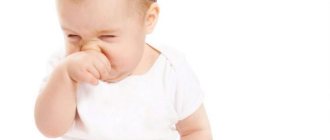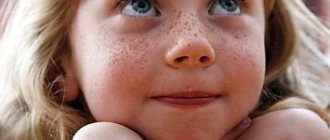Causes of breathing through the mouth in babies
Respiratory activity is carried out through the nasal passages. When the oral cavity is involved in the supply of air, this is not a usual physiological phenomenon for an adult, strong organism. Children are built differently. This is especially true for newly born babies.
The body is designed in such a way that breathing through the nasal passages is mandatory. Air enters through the nose, which is much colder than normal body temperature. Entering the respiratory tract through the nose, the air is warmed to body temperature and moistened.
The peculiarity of the structure of the mucous membrane of the nasal passages lies in the epithelial tissue, the cells of which have a huge number of cilia on their surface. Cilia perform the function of a filter, purifying the air from pollutants, foreign particles, and microorganisms.
When children breathe through their mouths, the air masses do not have time to warm up and become moisturized. The cold flow moves into the lower respiratory tract. Consequences - diseases of the respiratory system - bronchitis, pharyngitis, laryngitis, tonsillitis - become more frequent. Babies who inhale air through their mouths are susceptible to pneumonia - pneumonia.
Parents who notice the entry of air masses through the mouth in a child of older age categories turn to a specialist for help. Diseases and pathological processes in internal organs provoke inhalation of air through the mouth.
Attentive parents turn to the pediatrician. This is necessary to exclude serious pathologies. Children's diseases are characterized by a hidden, latent course.
Microorganisms and bacteria that cause dangerous diseases enter the body with air masses through the mouth. According to official data, children living in megacities with developed industry are three to four times more likely to suffer from viral and infectious diseases. Cold air entering the body through the oral cavity causes inflammation of the respiratory system.
The presence of a symptom manifests itself differently in children of different ages. For older children, the symptom is dangerous.
Regular inhalation and exhalation through the mouth for children over three years of age indicates the existence of problems with the paranasal sinuses. The sign appears with sinusitis and sinusitis. In addition to inhaling air through the mouth, inflammatory processes in the maxillary sinuses are accompanied by congestion and the inability to participate in nasal breathing.
The appearance of a symptom during the rest period during the day or at night requires control and observation. If parents notice that while resting their children throw their heads back too much and that their breaths are noisy and frequent, you should consult a doctor. In the absence of diseases of the ENT organs, the problem can be easily eliminated without drug treatment. Choose a pillow for your child, taking into account preferences and anatomical features.
In school-age children, the appearance of a symptom indicates the presence of adenoids. The disease is characterized by excessive growth of adenoid tissues, which spread to the nasopharynx and oral cavity. The pathological process develops over a long period. It takes from six months to 2-3 years for tissue to grow. The presence of adenoids provokes difficulty in nasal inhalation and exhalation. The progression of the disease gradually leads to the exclusion of the nasal passages from the respiratory process.
Due to its hidden course, it is almost impossible to suspect the development of the disease. 6-12 months after the onset of pathological processes, respiratory movements are performed through the mouth. The symptom occurs regardless of the time of day.
Otolaryngologists note the difficulty of treating adenoids with drug therapy. Surgical treatment allows you to completely get rid of adenoids.
Enlarged palatine tonsils provoke oral breathing. The reasons for the increase can be varied. Most often, the increase is a consequence of diseases of the ENT organs of bacterial etiology - tonsillitis.
Chronic pharyngitis, laryngitis, tonsillitis lead to hypertrophy of the tonsils. Enlarged tonsils lead to narrowing of the airways and difficulty breathing. The consequences of narrowing the lumen are dangerous not only due to the entry of air masses through the mouth, but also the development of complications.
Long-term, uncontrolled hypertrophy of the tonsils is fraught with the development of respiratory failure in children, resulting in attacks of suffocation and oxygen deficiency in cells, tissues, and organs.
The cause of abnormal breathing is the presence of polyps. A polyp is a benign formation that narrows the lumen of the airways. Education can be one or many. Doctors note active growth in children suffering from chronic diseases of the ENT organs, which have a decrease in the body’s protective barrier.
According to otolaryngologists, the presence of polyps in the nasopharynx and oral cavity is typical for children 6-13 years old. The appearance of a pathological process causes a hereditary predisposition.
When mom or dad suffered from polyps of the ENT organs, the likelihood of pathology in the offspring increases 2-3 times. Treatment of polyposis is a long, difficult process. The otolaryngologist selects therapy personally. In each case, he evaluates the number of polyps, growth activity, and the presence of concomitant diseases.
Diseases of the ENT organs of viral etiology, frequent colds provoke the occurrence of inhalation and exhalation through the mouth.
Viral diseases that cause a runny nose and congestion in the nasal passages force the baby to breathe through the mouth. The symptom appears in cases of influenza and ARVI.
Diseases of an allergic nature are accompanied by inflammation and swelling of the nasal mucosa - rhinitis. Rhinitis causes inhalation of air masses through the mouth. Allergic manifestations worsen during the flowering season.
Spring and early summer are the times of exacerbation of allergic reactions and rhinitis. Pollen from the inflorescences of trees and shrubs enters the nasal cavity and the mucous membrane of the oropharynx, causing swelling and inflammation. Little people who have a tendency to individual intolerance to pollen are susceptible to the development of rhinitis.
Injuries suffered affect the quality of breathing. Severe bruises, fractures, and curvatures of the nasal septum make it impossible to fully breathe through the nose. Children are forced to breathe through their mouth. Post-traumatic breathing disorder occurs in adolescent males. Damage and blows that occur in the nasal area are dangerous due to a fracture of the nasal septum. Frequent, active breathing movements through the mouth occur.
Surgical treatment will help to cope with the resulting septal defect. As a result of surgical intervention, the integrity and function of the septum are restored. Without surgical treatment, recovery and full nasal breathing is impossible.
In school-age children, mouth breathing occurs as a result of physiological characteristics. Hyperactivity and intense physical activity contribute to this.
Increasing the load increases the small body's need for oxygen. To satisfy the need, the child actively, often takes in air with his mouth.
Causes of an open mouth during sleep
If a person sleeps with his mouth open, the reasons may include difficulty breathing through the nose. As a rule, this is facilitated by allergies, adenoids, deviated nasal septum and apnea. In addition to chronic forms of diseases, there are temporary difficulties with nasal breathing - this refers to the influence of colds.
When sleeping with your mouth open, the reasons may lie in such areas as:
Respiratory disorders
The disease often occurs in adults with unresolved problems with the respiratory organs. In situations where there is nasal congestion, fever and sore throat, a person cannot breathe normally. Accordingly, you have to sleep with your mouth open.
Seasonal ARVI and such chronic forms of diseases as:
- rhinitis;
- sinusitis;
- sinusitis.
Causes mouth opening during sleep, weakness in strength and general physical malaise. A timely visit to an otolaryngologist will help correct the situation. As a preventative measure, doctors recommend annually relaxing in the mountains or on the sea coast among eucalyptus trees. The air in such an area helps to normalize the functioning of the respiratory organs and also reduces the likelihood of allergic manifestations.
Incorrect posture while sleeping
According to somnologists, people whose mouths open when sleeping do not adopt the correct posture while resting. Incorrect body positioning includes sleeping on your back. In addition, the condition is facilitated by a low pillow when the head is thrown back and the teeth open.
Patients who move restlessly in bed during sleep often end up face down. Thus, there is a slight deformation of the mouth or the nose sticking into the pillow. Subsequently, the person has to open his mouth slightly to avoid suffocation.
In view of this, a dilemma naturally arises as to what to do in this situation. Somnologists recommend performing a simple procedure at night - inspecting the bed for a comfortable location. You should lie down for a few minutes, assess the presence of discomfort and, if possible, eliminate it. Additionally, take soothing herbal tea, prevent light from penetrating through the curtains and ventilate the room. This will allow you to sleep peacefully and prevent your mouth from opening.
Weakening of the orbicularis facial muscle
Another factor that will cause your mouth to open at night is a weakening of the orbicularis muscle. As a rule, this condition is diagnosed in childhood due to the fact that the muscle in children has not yet been trained. The disease is recorded in older people. This condition occurs due to age-related changes in the loss of elasticity of muscle fibers.
Attention! Weak orbicularis facial muscle in children is considered normal up to 2 years of age. If the problem occurs at an older age, consultation with a medical specialist and daily exercise are recommended. If left untreated, in the future, the child faces enlarged adenoids and malocclusion.
Treatment of the disease begins with a visit to an ENT doctor. After studying the problem, the doctor prescribes comprehensive measures to neutralize the disease. Such measures include exercises on facial expressions and self-massage.
Problems in the field of dentistry
Dental diseases, on the one hand, do not interfere with breathing, but on the other hand, they force a person to keep his mouth open. First of all, it is not aesthetically pleasing. Secondly, the likelihood of infection with pathogenic microbes that worsens health increases. In addition, there is an unpleasant odor from the oral cavity and there is a risk of developing carious deposits.
The way out of the situation is to have annual preventive examinations with dentists. This is also true for those who do not experience pain and generally feel good. Doctors advise:
- Visit the hygiene office to clean teeth from carious stones at least 2 times a year.
- Brush your teeth correctly.
- Use rinses and other procedures prescribed by your dentist.
Neuralgic disorders
Opening of the mouth during sleep can be provoked by sluggish and not manifested symptoms of a neurological disease. Often illnesses occur in hidden forms, i.e. without showing clinical signs. However, this gives rise to an advanced form of the disease. The main symptomatic picture (especially in childhood) is a high level of saliva, a sagging tongue and an open mouth during sleep.
If such signs are detected, you should immediately make an appointment with a neurologist. As a preventive measure against neurological disorders, doctors recommend:
- reduce psycho-emotional stress;
- shares exciting problems with family and friends;
- do not refuse help;
- rationally distribute time for work and rest.
Why does a baby breathe with his mouth open?
Mothers of newborns often note the presence of mouth breathing. The phenomenon occurs during the period of daytime and nighttime dreams of the baby. Newborn babies spend most of their time sleeping. Adequate rest is required for normal growth and development. Babies constantly sleep at night and during daylight hours.
Dust and small contaminants settle on the sensitive mucous membrane, damaging it. The mucous membrane of newborns is especially tender and sensitive. Insufficient activity of the protective barrier leads to infection with viral and bacterial infections.
In infants, it is difficult to determine the cause of mouth breathing; there are many of them.
An uncomfortable position during sleep is accompanied by inhalation of air through the mouth. Parents should change bedding, mattresses, and sleepwear that cause discomfort. The baby should be comfortable to sleep.
Physiological nasal congestion in this age group leads to breathing problems. The symptom appears in every second baby.
Premature babies, children born with pathologies, anomalies in the development of ENT organs suffer from nasal congestion during the first few years of life.
To make breathing easier, maintain microclimate parameters. Dry air contributes to drying out of the mucous membranes. The air humidity in the room where the child is located is normally at least 55%.
If you cannot maintain humidity within 55%, use humidifiers. The devices easily cope with the task, preventing a decrease in humidity.
Infants, like any children, suffer from viral and colds. The source of infection is the parents. When mom and dad are sick, they must take safety measures - limit direct contact, use separate utensils, wear medical masks.
Do not contact, do not invite to visit, do not take your baby to sick or feverish people. The baby is infected by friends and relatives who come to visit and meet a new family member.
The neck muscles in newborns are not developed, weak, and decreased tone is often noted. Hypotonia manifests itself in the form of throwing the head back. It takes time for the muscles to become stronger so that the child can hold his head and turn.
Hypotonia of the muscles of the neck and shoulder girdle contributes to oral respiratory activity. When the muscles become stronger, the alarming symptoms will disappear. This period requires parental control.
If symptoms have not resolved by six to nine months of age, consult your pediatrician.
What can be done?
To eliminate the symptom, watch the baby fall asleep. The position in which the baby sleeps is comfortable and does not cause discomfort.
The crib and bedding are selected taking into account anatomical features. Modern manufacturers of children's bedding offer orthopedic mattresses and pillows. Relaxing on orthopedic bedding strengthens muscles, the spine, and normalizes breathing.
Clean the baby's nose, remove mucous contents that interfere with normal breathing. Use aspirators for effective cleaning. To rinse the nasal passages, use saline solution and nasal moisturizers.
The presence of disease and inflammatory processes in the ENT organs requires consultation with an otolaryngologist. The specialist will select drug therapy. Drugs that have a vasoconstrictor effect are prescribed. Drops and sprays relieve swelling of the nasal mucosa, making breathing easier.
Treatment of diseases of bacterial etiology is carried out using local antibacterial drugs.
The period of use of vasoconstrictor drugs does not exceed 8-10 days. If the use of sprays or drops does not bring the desired effect, breathing has not been restored, consult a doctor to adjust the treatment.
Treatment of diseases of allergic etiology is carried out with the prescription of antihistamine drugs. Antihistamines restore hypertrophied mucous membranes as a result of irritation by the allergen.
In order to normalize breathing, general and local drugs are used. The period of admission is 10-14 days.
It is difficult for children to get rid of the habit of inhaling air through their mouths. The task of parents is to control behavior. For kids who don’t understand and don’t know how to control themselves, try to convey the essence in the form of a game. Little children love animals. If your little one loves bunnies, tell them that bunnies breathe only through their nose. The psychological trick works flawlessly for children 2.5-4 years old.
Explain to older children in language they can understand. Tell him that he should breathe through his nose, not his mouth. Give an example - this is what parents, brothers, sisters, and friends do in the yard.
Explain to school-age children that breathing through the mouth is fraught with the development of complications. Conversations and persuasion are used when nasal breathing is not difficult.
The video informs about the dangers of mouth breathing.
How can improper breathing be dangerous?
In infants, the capillary network is located on the surface of the oral mucosa and can easily be damaged by small dust particles. The baby’s immune system is still immature, so a bacterial infection can easily penetrate the tiny body.
Thanks to the structure of the nasal passages, cold air is warmed before entering the bronchi. In addition, the ciliated epithelium of the nasal mucosa retains dust and pollen, protecting the baby from developing asthma. The mucus produced in the nasal passages traps and partially destroys bacteria.
When a person breathes through the mouth, cold, polluted air enters the bronchi. To prevent the development of respiratory diseases, parents should make sure that the baby is breathing properly.
If a child always breathes only through his mouth, he experiences oxygen starvation, which leads to suppression of brain activity and the development of anemia. The baby becomes weak, lethargic and apathetic, and may subsequently lag behind in intellectual and physical development. Such children get sick much more often than their peers due to weakened immunity. If a newborn breathes through his mouth, his voice becomes nasal and monotonous (we recommend reading: a newborn breathes quickly). The child loses the ability to perceive smells and suffers from lack of appetite.
The importance of breathing through the nose
Breathing through the nose is very important. If a child has mouth breathing for a long time, this can lead to certain negative consequences.
Here are examples of these negative consequences:
- As a result of mouth breathing, unpurified and cooled air enters the body, which can lead to sore throat, bronchitis, and laryngitis.
- The child receives 20% less oxygen, which is important for normal development and functioning. The brain experiences oxygen starvation, mental and physical development is delayed, memory deteriorates, and attention is distracted. Also, an insufficient amount of oxygen can provoke the development of hypoxia or anemia.
- Due to breathing through the mouth, adenoids begin to develop, which will become an additional obstacle to nasal breathing.
- The nasal passages narrow.
- The sense of smell deteriorates and appetite decreases.
- Constant headaches occur.
- The maxillary sinuses do not develop properly.
- The facial skeleton develops incorrectly, and there is a malocclusion.
- The orbicularis oris muscle weakens, the lips do not close well, and as a result, the lower jaw does not develop fully.
- The growth of the upper jaw slows down. As a result, a high dome of the sky is formed, and the pronunciation of hissing words and the letter R is impaired.
- Due to the low position of the tongue, the timbre of the voice changes.
- Posture is impaired and muscle pain occurs.
- There is a possibility of pathological development of the chest.
These problems can occur if a child breathes through his mouth for a long time (more than a year). An experienced otolaryngologist can help in identifying the true causes of mouth breathing in a baby.
Why do babies breathe through their mouths?
Some parents wonder why the baby breathes with his mouth open? When the baby is born, she mainly feeds on milk from her mother’s breast and sleeps. Thanks to long sleep, children actively grow and develop. It is during sleep that infants sometimes begin to breathe through their mouth. Why do they do this, where does mouth breathing come from in infancy?
This phenomenon can occur due to various factors, for example, if the baby sleeps in an uncomfortable position or in an uncomfortable crib. In addition, the culprit may be a runny nose, which disrupts the nasal breathing process. If a child was born premature and has any anomalies or disorders in the structure of the ENT organs, there is a high probability that the runny nose will last for a long time. In addition, too dry air dries out the mucous membranes of the nasopharynx, so parents need to monitor the air humidity in the children's bedroom and, if necessary, install a humidifier.
What should parents do if their child breathes through his mouth?
When a newborn baby, or even an older baby, begins to breathe through his mouth, his sleep may be disturbed. Parents should first check to see if their child has a runny nose. If suddenly there is congestion in the small nose, you need to rinse it and drip it with vasoconstrictor drops. The dry air in the apartment may be to blame. Because of this, the natural mucus in the baby’s nose dries out, making breathing more difficult.
The usual way to get rid of this problem is by carefully cleaning your small nose with oil and cotton pads. In the future, you need to ventilate the room more often, or even better, purchase an air humidifier.
If the mother does not detect the described symptoms, but the baby still cannot breathe through his nose, it is better to go to an appointment with an ENT doctor, because there is a possibility that the baby’s adenoids have begun to become inflamed.
Another situation should attract the attention of parents - if the baby has snot without fever. First, clean the nose with wicks and soda solution (dissolve one teaspoon of soda in a glass of water), and then you can drip in 1-2 drops of breast milk, because it contains all the protective substances that a person produces throughout his life. If the mother does not have milk, it is permissible to add a couple of drops of heated vegetable oil.
Most often, a runny nose is a manifestation of a viral disease. The nozzles contain substances that neutralize viruses. It is important for parents not to allow the mucus (snot) to dry out. Cool, clean air and plenty of fluids consumed internally will help with this. After all, if the mucus dries, the baby will begin to breathe through his mouth, which will cause the mucus in the lungs to dry out and the bronchi to become clogged. And this is a direct path to the development of pneumonia (inflammation) in them. You can moisten your baby's nasal passages with drops that will make the mucus more liquid.
The child sleeps with his mouth open: what to do?
Often, children sleep with their mouths open, but they breathe through their nose. This option does not pose any danger and there is no need to worry. This can happen because during deep sleep, all the muscles of the child’s body completely relax, and the mouth can open. In this case, you just need to carefully close the child’s mouth.
It is worth paying attention to how the child sleeps at night and taking some measures to find out the reasons for this phenomenon. To do this, parents will have to take several actions.
The first step is to check the baby's breathing: whether it is done through the nose or mouth. It won't be difficult to find out. To do this, you just need to bring the back of your hand to the child’s face. This part of the hand is highly sensitive, so it will be easy for parents to understand where the breeze is “blowing” and whether the baby is breathing through the nose or mouth. In the case when breathing occurs through the nose, there is no need to worry, the baby is simply fast asleep and his mouth is open. It’s a completely different case if the child still breathes through his mouth. In general, there is a statement that children do not know how to breathe through their mouth, since their body is configured in such a way that during feeding they swallow with their mouth and breathe through their nose.
The second action that needs to be taken is to find out the baby’s body temperature. At this moment, you should not rely on tactile sensations, because the mother may not feel minor deviations from the temperature (for example, if the temperature is 37 degrees). Therefore, it would be better to use a thermometer to measure temperature. An increase in temperature may indicate that the newborn has a cold, so you should call a doctor. If the body temperature is more than 38 degrees, then you must immediately call an ambulance, or give the child an antipyretic yourself.
A newborn baby cannot breathe through his mouth. It takes some time for your baby to fully develop this reflex. Therefore, if a child breathes through the mouth rather than through the nose, this may indicate blockage of the nasal passages and airways.
Possible reasons why a child sleeps with his mouth open
Mouth breathing can occur as a result of the following conditions.
1. Slime
A buildup of mucus in your baby's tiny nose can clog his nostrils and make breathing difficult. Since the child cannot breathe through his nose, he begins to do so through his mouth.
2. Sleep apnea
Sleep apnea is a disorder in which movement in the upper respiratory tract is difficult due to various reasons: for example, inflamed tonsils, enlarged adenoids, infection. Symptoms of these diseases: snoring, restless sleep, irregular breathing and mouth breathing.
3. Deviated nasal septum
The nasal septum divides the nose into two separate nasal passages. When it is skewed or deformed, nasal breathing is difficult, and the child is forced to breathe through the mouth.
The development of a deviated septum can occur during the embryonic stage, resulting in some children already being born with this feature.
4. Allergies
Children may develop allergies that cause excessive mucus production, which can then block the nasal passages. In this case, disinfecting the nose with a nasal aspirator will help.
5. Habit
Children who have a history of breathing problems may develop the habit of mouth breathing.
What are the dangers of sleeping with your mouth open?
1. Dry lips and mouth
Mouth breathing causes saliva to evaporate quickly, which may cause the baby to experience dry mouth and lips.
2. Exacerbation of asthma
The nose filters irritants, dust and pollutants, but the mouth cannot do the same. Breathing through your mouth can cause potential allergens to enter the lungs, increasing the risk of an asthma attack in children who already have the condition.
3. Tongue push
Babies who normally breathe through their mouth may have a tendency to press their tongue against their front teeth. This condition is called tongue thrust. Repeated mouth breathing can weaken the tongue and mouth muscles, causing the tongue to push. This can eventually lead to problems such as misaligned teeth, difficulty chewing food, and even speech problems.
4. Face change
Mouth breathing can interfere with the healthy development of the jaw and facial muscles. This can cause structural changes in the face, making it appear longer or narrower.
5. Postural changes
To breathe more easily through their mouth, children often tilt their head. This puts pressure on the pelvis, back, shoulders and neck, which has implications for posture as well as healthy musculoskeletal development.
6. Behavioral changes
Research shows that mouth breathing can cause sleep disturbances, which in turn lead to symptoms similar to those encountered in attention deficit hyperactivity disorder (ADHD). In addition, children with ADHD often experience lack of sleep, which can also cause mouth breathing.
7. Lack of sleep and development
Babies grow in their sleep. If a child breathes through his mouth while resting, it is likely that he will not get enough sleep, which can affect growth, concentration, behavior and overall development in the long term.
How to stop a child from sleeping with his mouth open?
Here are some ways to help stop your child from mouth breathing.
1. Humidify the air
Invest in a cool mist humidifier that will increase the moisture content in the air. Increased humidity relieves swelling of a stuffy nose and makes nasal breathing easier.
2. Prepare a warm bath
A warm bath not only helps babies relax, but also clears mucus that has accumulated in the nasal passages.
3. Add salt water
If the mucus in your child's nose is thick, try putting salty drops in the nose to thin it out.
4. Make sure your baby is hydrated frequently.
Give your baby enough milk or formula. Drinking fluids prevents dehydration.
5. Install the air filter
The presence of allergens in the air can cause allergies, which in turn can cause nasal congestion. An air filter will help you cope with allergens.
6. Use a nasal syringe
You can use a nasal syringe to suck out mucus from your nose. However, this should be done with extreme caution, since the nasal passages in children are very sensitive.
7. Keep your house clean
If you have pets at home (and others), you should vacuum your home frequently to remove hair, dander, and other allergens.
References:
- Nasal Congestion (Infant/Toddler); Fairview
- D. O. Rodenstein, N. Perlmutter, and D. C. Stanescu, Infants are not obligatory nasal breathers; NCBI
- Suemy Cioffi Izu et al., Obstructive sleep apnea syndrome (OSAS) in mouth breathing children; NCBI
- Septoplasty; US National Library of Medicine
- Kian Karimi, Is Your Nose Bent Out Of Shape? Maybe It's A Deviated Nasal Septum; Pacific Neuroscience Institute
- Deviated Septum in Children; Columbia University
- What is a Tongue Thrust?; Intermountain Healthcare
- Masahiro Sano et al., Increased oxygen load in the prefrontal cortex from mouth breathing: a vector-based near-infrared spectroscopy study; NCBI
On Vikids you can:
Read similar articles or write your own
Chat on the forum
Medication assistance
If a newborn regularly sleeps with his mouth open, he needs to be shown to a pediatrician so that the doctor can determine whether this condition is normal or pathological. When nasal breathing is complicated by an excess of mucous secretions, the nasal passages of the infant need to be washed with special solutions. Basically, saline solution or medications for infants are used for washing.
When depression of respiratory function appears due to the development of pathologies, it is also necessary to consult a doctor to draw up the optimal treatment method. Typically, nasal local medications that constrict blood vessels are used for treatment. These drugs make it possible to eliminate swelling, which facilitates the process of inhaling and exhaling air through the nose.
Symptoms caused by infections caused by bacteria can be minimized by using antibacterial medications.
The best option is to treat the affected area with topical medications. Nasal drops are prescribed in a course of 7-10 days.
If the baby breathes through the mouth due to the development of allergies, it is necessary to use antihistamines to treat it. Such medications normalize nasal breathing and relieve congestion and swelling of the mucous membrane. To eliminate the allergic inflammatory process, local therapy and internal medications are used. Such medications are prescribed in a course, the duration of which does not exceed half a month.
Timely treatment of developed pathologies will help to quickly normalize nasal breathing. It should only be started after consulting a doctor, since the optimal method of therapy will depend on the reasons affecting sleep with your mouth open.
Great article 0 KM
ALSO READ ALSO:
A 5 month old baby sleeps restlessly at night and during the day
Causes and treatment of sleepwalking in children
What sleeping pills are there for children?
Incorrect posture
Why do people sleep with their mouths open if they don't have nasal diseases? According to somnologists, this may be due to incorrect resting posture. Incorrect body positions include sleeping on your back. The condition described in the article appears from a low pillow when the head is thrown back and the teeth become separated.
People who move around in bed during sleep often end up face down. This results in a slight deformation of the mouth or the nose pressing into the pillow. This is how a person opens his mouth so as not to suffocate.
Somnologists advise performing a simple procedure at night - inspect the bed for a comfortable location. You need to lie down for a few minutes and evaluate the comfort. You can take soothing herbal tea, close the windows with curtains and ventilate the room. This improves sleep.
Does the age of the child matter?
Experts report that it is necessary to take into account the age of the baby, at which he often began to sleep at night with his mouth open. If the child is very small, for example, he is 2 months or one year old, then it is advisable for parents to immediately go to the hospital, because it will be very difficult to determine the cause of this condition on their own at home.
If the baby is over 3 years old, then often the reason why he began to inhale through his mouth is some kind of disease of the paranasal sinuses. In addition, this symptom occurs in children with prolonged chronic sinusitis or sinusitis. These diseases are often accompanied by nasopharyngeal congestion, runny nose, and at night the baby begins to sniffle, snore in his sleep, and sometimes the snoring becomes very strong and loud.
If there is difficulty in nasal breathing in a school-age child, and he inhales air through his mouth, then the adenoids may be the culprit. In this condition, adenoid tissue, which usually appears in the nasopharynx, actively grows. It usually takes a long time for adenoids to grow large, often reaching large sizes after several years. Inhalations and exhalations are disrupted gradually, and over time the situation worsens.
It is very difficult to determine the presence of adenoids at the initial stage of development. Usually, after a few years, the baby begins to constantly breathe through his mouth, both day and night. Severely pronounced adenoids are cured in rare cases with the help of medications; surgery is often necessary.
Why is my nose stuffy?
To understand why a child breathes through his mouth, you need to analyze his breathing during sleep, during active play, and while feeding. You should also pay attention to the child’s appetite, mood and measure the temperature. Let us conditionally divide the reasons into several groups.
Congenital anomalies
Typically, birth defects are discovered in the first years of life.
Difficulty in nasal breathing may occur due to a deformed septum. Violation of the ventilation function of the nose predisposes to swelling of the mucous membrane and activation of opportunistic microorganisms.
Chronic inflammation leads to wheezing, grunting and even snoring. In this case, treatment may involve surgery. The operation allows you to change the structure of the septum and ensure full nasal breathing.
Among congenital pathologies, it is also worth highlighting infectious and autoimmune diseases that reduce the level of immune defense. Against the background of immunodeficiency, the child becomes more sensitive to the negative influence of environmental factors. Changes in the structure of the nose can be observed as a result of traumatic exposure, which may require the help of an oral and maxillofacial surgeon.
Rhinitis
There are many forms of rhinitis, but we will focus on vasomotor, infectious and catarrhal rhinitis. As for the vasomotor type, it can be manifested by congestion in one nasal passage, as a result of which it is difficult to breathe through the nose, so children open their mouths slightly.
Symptoms usually worsen after hypothermia or prolonged exposure to dry air. When the child lies on his side, congestion is observed in the underlying nasal passage. During sleep, the baby may snore, and during the day, from time to time, breathe through the mouth.
Infectious and catarrhal rhinitis goes through several stages. We are interested in the first stage, when:
- swelling of the nasal mucosa occurs;
- sneezing, itchy nose;
- a deep voice is noted;
- There is no way to breathe through the nose.
At the first stage, small amounts of mucus may be released, which further reduces the lumen of the nasal passages. If children's immunity is strong enough, a runny nose may end in the first stage, but this is extremely rare.
Neoplasms in the nasal passages
Sniffling in children may occur as a result of narrowing of the nasal passages by additional formations, such as polyps, cysts or malignant growths.
The emergence of such neoplasms is promoted by:
- chronic infection in the nasopharyngeal area;
- poor ecology (smoke, smog);
- structural defects of the nose.
This group of causes also includes foreign bodies that have entered the upper respiratory tract. While playing, the child can inhale or insert a button, small construction item, or bead into the nostril. The child’s condition sharply worsens, shortness of breath, lacrimation appear, and hysteria develops.
If the foreign body is located near the nostrils, parents can remove it themselves. When an object moves into the choana zone, its visualization becomes difficult. Sometimes it can be located in the nasopharynx in such a way that the child does not even feel it.
The object can irritate the mucous membrane, causing it to swell and making breathing difficult. Only an otolaryngologist can help in this situation after a thorough examination of the nasopharynx.
Penetration of a foreign element into the larynx is especially dangerous, which can provoke laryngospasm.
Due to irritation of the larynx, a reflex closure of the vocal cords and closing of the gap occurs, which manifests itself as suffocation and threatens the baby’s life. In infants, the lumen of the larynx is smaller than in older adults, so the risk of death is much higher.
Is there any reason to worry?
There are several conditions when a person is unable to inhale and exhale air through the nose. Such conditions are caused by the active development of pathologies of the ENT organs.
- Rhinitis . When your baby sleeps with his jaw down, you need to see a doctor to rule out the possibility of respiratory pathologies. This factor can also affect a child 1 month old. A severe runny nose, making it difficult to breathe through the nose, can appear against the background of the development of adenovirus infection, influenza, or ARVI.
- Allergy. Breathing through the mouth is also provoked by the development of allergies. Under such circumstances, the child suffers from nasal congestion at night and is forced to inhale and exhale air through the mouth.
- Nose injuries. Damage to bone and cartilage tissue provokes inhibition of full nasal breathing. Most often, such difficulties are diagnosed in teenage boys. If a bruise occurs, a most dangerous injury to respiratory function can occur—a septal fracture. After this, nasal breathing is completely suppressed. In this case, its full restoration is prescribed. If you neglect treatment, it will not be possible to return to normal, undifficult breathing.
- Tonsils. Often, young children have swollen tonsils. This inflammation can be caused by many factors. This is mainly diagnosed in children who have recently had a sore throat.
- Chronic tonsillitis causes a narrowing of the airways. The long-term development of this pathology affects the appearance in the child of symptoms of respiratory failure associated with the occurrence of oxygen starvation of tissues.
- Polyps . An increase in the size of polyps can lead to respiratory dysfunction, since these neoplasms can inhibit nasal breathing. Their rapid increase is diagnosed in children with reduced immunity or ENT pathologies. According to statistics, nasopharyngeal polyps are mainly diagnosed in children 5-12 years old. The main reason for the appearance of polyps is considered to be heredity.
- Adenoids. Schoolchildren begin to inhale and exhale air through their mouths due to enlarged adenoids. In this case, the growth of adenoid tissue in the nasopharyngeal area is typical over a couple of years.
- Sinusitis and sinusitis . Symptoms of pathologies of the paranasal sinuses can interfere with the normal breathing of babies over 3 years old. This sign of pathology can occur in children suffering from a long course of chronic sinusitis or sinusitis. Such pathologies are also characterized by the occurrence of severe nasal congestion.
How to wean your baby from sleeping this way
If a child constantly sleeps with his mouth open, he needs help to establish nasal breathing. To ensure your newborn breathes correctly, you need to use the following tips:
- choose the right crib, mattress and pillow for your baby;
- regularly clean the nasal passages using a special aspirator that allows you to safely rinse a child’s nose;
- If an illness develops or an allergy appears, you should urgently show the baby to a pediatrician.
It is difficult to wean children from breathing through their mouth. If the baby is 3 or 4 years old and he shows interest in representatives of the animal world, then he can be told that they inhale and exhale air through their nose, and not through their mouth.
Correcting the breathing of older children involves conducting a dialogue based on facts about the people around them. When a child begins to breathe through his mouth, it should be explained: in order to learn to breathe correctly, he needs to repeat after his parents or other people who inhale and exhale air through their nose. A school-age child needs to be told about the harm that mouth breathing brings and shown how to overcome this habit.
The Importance of Closed Sleep
Typically, people who can open their mouths in their sleep snore. Sometimes a slightly open mouth is observed in children, especially when they are dreaming about something. It is noteworthy that the reasons may be different. However, doctors note that the main reason lies with the canals located in the nose, sinuses and throat. Thus, swelling may form in the oropharynx or the adenoids may enlarge.
It is important to understand that nature has provided the human body with a closed mouth when breathing. Since air enters through the nose, where it is cleaned and warmed. Therefore, if breathing passes through the mouth, then a lack of oxygen saturation in the blood develops. In other words, only through nasal breathing do the lungs expand 100%. If you open your mouth and breathe like that, only the upper roots of the lungs will work.
Further, the importance of closed-mouth breathing is also important to reduce the risk of hypoxia, in which the brain tissue is unable to fully oxygenate. In childhood, this is fraught with mental retardation.
Sleeping with your jaws unclenched is also dangerous because there are no antibacterial substances in the cavity. Which, naturally, promotes the development of pathogenic microorganisms. Hence the bad breath, because... When breathing through the mouth, the mucous membrane dries, the secretion of saliva, which kills germs, decreases.










